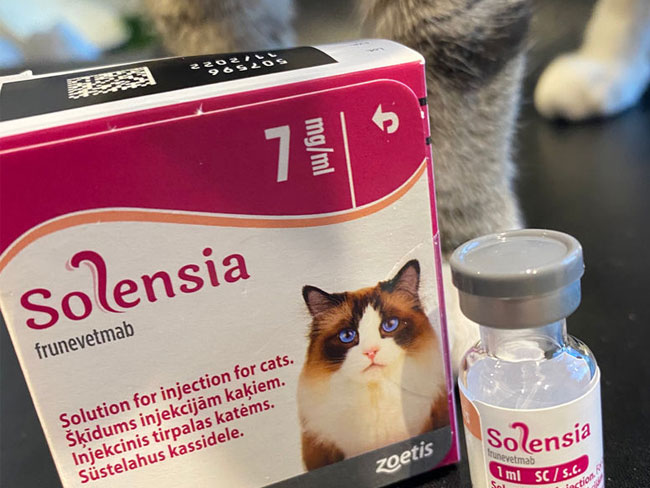As our feline and canine pets live longer, we are seeing the conditions that arise from a long, happy life with its wears and tears on the body, much as we do with people. One common complication is osteoarthritis – or commonly referred to as just arthritis.

As pressure is repeatedly placed on joints, the more time that goes by, the more wear and boney cartilage damage we see. People commonly notice the issues in their canine friends but sometimes miss it in cats as they are not being walked or taken outside to run and interact in the same ways.
But cat joints get damaged too over time.
For over a decade there have been a number of treatment options for the management of arthritis including joint protectors including glucosamine and chondroitin sulfate products as well as NSAIDs (non-steroidal anti-inflammatories).
There are options such as omega-3 fatty acids and also pain medications like gabapentin which don’t address inflammation and may cause sedation.
The NSAIDs are probably the best sole agent for addressing pain and inflammation. But they come at a cost. They can cause issues in patients with kidney problems, lead to gastro-intestinal symptoms and cats cannot clear these products from their bodies as well as dogs and are more likely to have kidney issues, so in the US there are no products for cats labeled for long-term use.
That’s where two new products come in and are creating quite the buzz. These products are monthly injections and work in similar ways in cats and dogs for reducing pain and inflammation.
Solensia

Solensia is a new veterinary product, It works as a cat-specific antibody designed to recognize and attach to a nerve growth factor (NGF), which is involved in the regulation of pain. When the antibody binds to NGF, it prevents NGF from attaching to its receptors on nerve cells. It is here, when bound, that NGF signals pain through pathways in the body. Since Solensia blocks this attachment, it reduces NGF’s ability to cause pain associated with osteoarthritis.
Librela

This is the dog equivalent of Solensia. It is also an antibody that recognizes and interferes with its attachment to receptors that transmit pain. .
Both of Librela and Solensia come as injectable medications for monthly use. The recommended dose depends on pet’s weight, and the medicine requires a prescription and is usually given at your veterinarian’s practice. If can only be obtained with a prescription, you should consult with your family vet to see if these are good options for your cat or dog – or both!for the best possible recommendation for your pet.
These two antibody medications circumvent the typical ones associated with kidney issues and intestinal problems as well as clearance issues in cats. That said, all medications have some type of contraindication. But, compared with traditional treatment, the impact and damage on patients will be less.
The most common side effects with Solensia are skin reactions (itching, skin inflammation and hair loss); and the most common side effects with Librela are mild injection site reactions, e.g., swelling and heat.
That said, as both of these injections are protein, in animals with auto-immune issues where the body attacks itself (often proteins and DNA) a medication like Librela or Solensia might not be the ideal choice.
In most instances, however, these two new options to combat long-term pain represent a promising option for older pets. We recommend that you talk to your veterinarian and see if Solensia and Librela might be good options for your older canine and feline companions.


